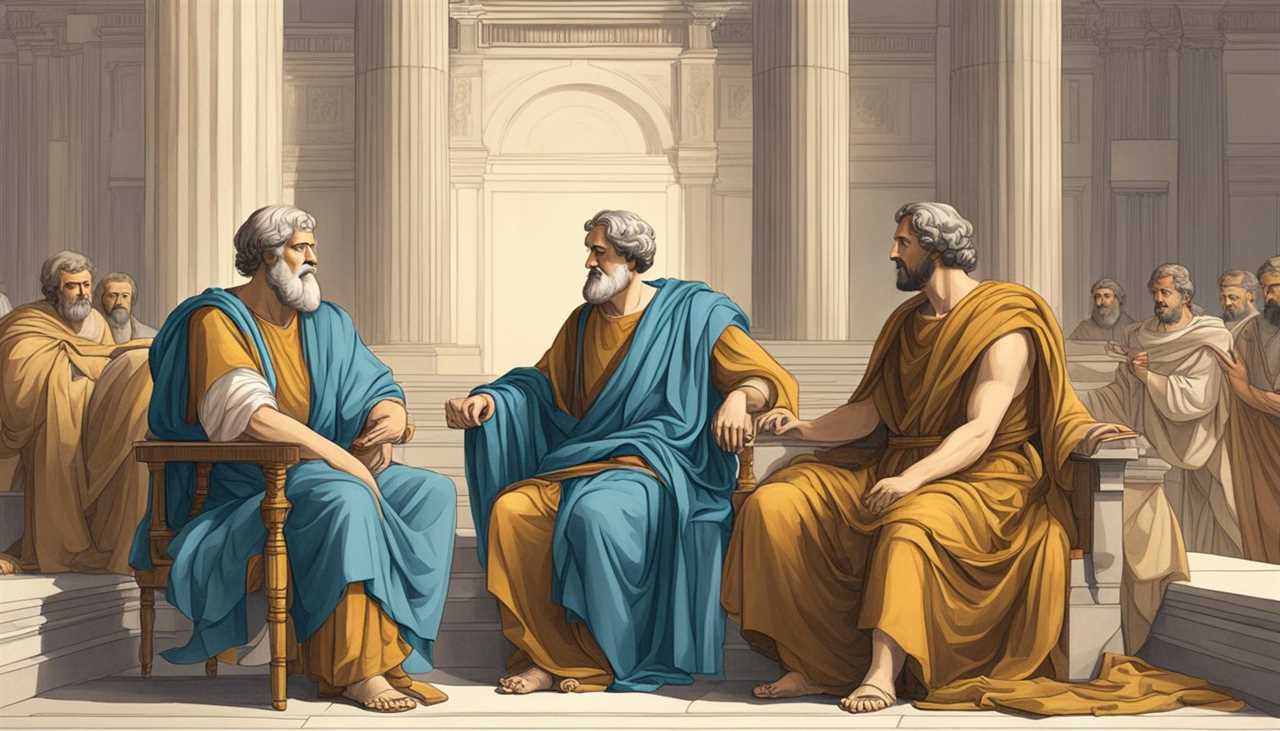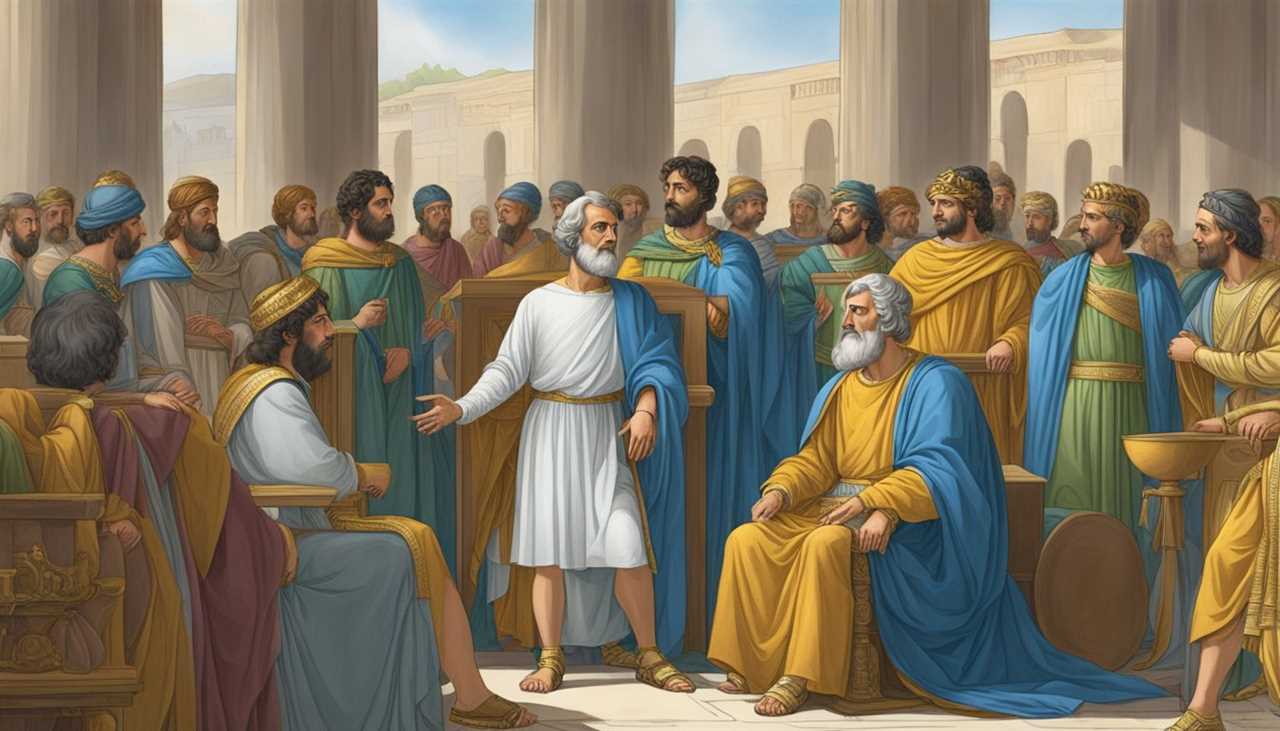Aristotle was one of the most influential philosophers of all time. His teachings have had a profound impact on Western civilization. One of his most famous students was Alexander the Great. Alexander went on to conquer much of the known world and establish an empire that lasted for centuries. Aristotle's influence on Alexander's life and reign was significant, and it is worth exploring what the philosopher taught the future king.

Alexander the Great was born in 356 BCE, the son of King Philip II of Macedon. When he was 13 years old, he became a student of Aristotle, a renowned philosopher and teacher. Aristotle tutored Alexander for three years, teaching him various subjects. These included logic, ethics, rhetoric, zoology, and politics. He also influenced Alexander's views on slavery, morality, and the natural order.
Aristotle's mentorship of Alexander had a profound impact on the young prince. In this article, we will explore what Aristotle taught Alexander, how he taught him, and how this impacted Alexander's reign and legacy. We will also address some frequently asked questions about the relationship between Aristotle and Alexander.
Key Takeaways
- Aristotle tutored Alexander the Great for three years, teaching him various subjects and influencing his views on morality, slavery, and the natural order of things.
- Aristotle's mentorship profoundly impacted Alexander's life and reign, shaping the course of his decisions and actions.
- The legacy of Aristotle's teachings can still be seen in the Western world today.
Aristotle's Influence on Alexander
Tutoring Role and Duration
Aristotle was a Greek philosopher who tutored Alexander the Great for several years. Aristotle's influence on Alexander was significant, as he taught him a wide range of subjects, including philosophy, ethics, politics, and science. Alexander respected Aristotle and valued his teachings, which helped shape his worldview and leadership style.
Philosophical Teachings
Aristotle taught Alexander about the importance of philosophy and how it could be used to understand the world and make sense of complex problems. He introduced Alexander to the works of Plato and Socrates, which helped him develop a deeper understanding of ethics and morality. Aristotle's philosophical teachings also influenced Alexander's views on leadership and governance. He believed that a good leader should be guided by reason and virtue.
Ethics and Leadership
Aristotle emphasized the importance of ethics and morality in leadership, which profoundly impacted Alexander's leadership style. He taught Alexander about the virtues of courage, wisdom, and justice and encouraged him to lead by example. Alexander's commitment to these virtues helped him to inspire his troops and gain their loyalty, which was critical to his success as a military leader.
Political Theory
Aristotle's teachings on political theory also significantly influenced Alexander's worldview. He introduced Alexander to the concept of the polis, or city-state, and explained how different forms of government could work in practice. Aristotle's ideas about democracy, oligarchy, and monarchy helped Alexander to develop his own political philosophy. This philosophy emphasized the importance of strong leadership and a well-ordered society.
Scientific Knowledge
Aristotle was also a renowned scientist, and he taught Alexander about the natural world and the principles of science. He introduced Alexander to the study of biology, astronomy, and physics, encouraging him to think critically about the world around him. Alexander's interest in science and his commitment to rational inquiry helped him to become a more effective leader. He could make informed decisions based on empirical evidence and logical reasoning.
Curriculum and Methods

When Aristotle was summoned to teach Alexander the Great, he devised a curriculum to shape the course of Greek civilization. The curriculum was rigorous, and Alexander displayed an insatiable thirst for knowledge, often pushing himself beyond the expectations of his tutors.
The Works of Homer
Aristotle introduced Alexander to the works of Homer, the famous Greek poet. He taught Alexander how to analyze and interpret the Iliad and the Odyssey, which helped him develop his critical thinking skills. The works of Homer also instilled in Alexander a love for poetry and literature.
Rhetoric and Persuasion
Aristotle taught Alexander the art of rhetoric and persuasion. He showed him how to use language to influence people and construct a persuasive argument. Alexander's ability to persuade people would become one of his greatest leadership strengths.
Logic and Critical Thinking
Aristotle also taught Alexander the principles of logic and critical thinking. He showed him how to analyze arguments and how to identify fallacies. These skills helped Alexander become a better strategist and a more effective leader.
Impact on Alexander's Reign

Military Strategies
Aristotle's teachings greatly influenced Alexander's military strategies. Aristotle taught Alexander about the importance of planning and preparation in warfare. Alexander applied these teachings in his military campaigns and conquered vast territories. He used his knowledge of geography and topography to his advantage, and his troops were always well-equipped and well-trained.
Cultural Fusion
Aristotle's teachings also significantly impacted the cultural fusion that occurred during Alexander's reign. Aristotle taught Alexander about the importance of understanding and respecting other cultures. Alexander used this knowledge to create a diverse and multicultural empire. He encouraged blending Greek and local cultures, which led to the development of a unique Hellenistic culture.
Administration and Governance
Aristotle's teachings also influenced Alexander's approach to administration and governance. Aristotle taught Alexander about the importance of justice and fairness in governance. Alexander implemented these teachings by appointing local officials to govern his conquered territories. He also allowed religious and cultural practices to continue as long as they did not interfere with his rule.
Legacy of the Mentorship
Hellenistic World
Aristotle's mentorship significantly impacted Alexander the Great, shaping his worldview and military strategies. Alexander's conquests spread Greek culture and ideas throughout Hellenism, influencing art, architecture, and philosophy for centuries. The Hellenistic period is characterized by blending Greek culture with conquered lands' cultures, resulting in a rich and diverse cultural landscape.
Educational Influence
Aristotle's tutelage of Alexander also profoundly influenced education in the ancient world. The relationship between teacher and student was highly valued, and the idea of a mentor guiding a young person's development became a common theme in literature and art. Aristotle's emphasis on logic, ethics, and rhetoric set the standard for education in the Hellenistic world and beyond.
Long-term Effects
The legacy of Aristotle's mentorship can still be felt today. The study of philosophy, logic, and ethics continues to be an important part of higher education, and the concept of mentorship remains a valuable tool for personal and professional development. Alexander's conquests also left a lasting impact on the world, spreading Greek culture and ideas across three continents and laying the foundation for the development of Western civilization.
Frequently Asked Questions
What subjects did Aristotle tutor Alexander the Great in?
Aristotle tutored Alexander the Great in various subjects, including philosophy, ethics, politics, economics, and natural science. Aristotle was one of the greatest philosophers of his time, and his teachings profoundly impacted Alexander's intellectual development.
How did Aristotle's teachings influence Alexander's approach to leadership?
Aristotle's teachings on ethics and politics significantly impacted Alexander's approach to leadership. Aristotle believed a good leader must be virtuous, just, and wise. He also believed that a leader must balance the interests of the individual and the community. These ideas deeply influenced Alexander, who strove to embody them throughout his reign.
What specific philosophies did Aristotle impart to Alexander?
Aristotle imparted many philosophies to Alexander, including his ideas on metaphysics, epistemology, ethics, and politics. Aristotle believed everything had a purpose and that knowledge could be gained through observation and reasoning. He also believed in the importance of virtue and the pursuit of happiness.
In what ways did Aristotle's mentorship shape Alexander's military strategies?
Aristotle's mentorship played a key role in shaping Alexander's military strategies. Aristotle taught Alexander the importance of strategy and tactics and instilled in him a deep appreciation for the art of war. Alexander's military campaigns were marked by his ability to adapt to changing circumstances and to think creatively on the battlefield.
How did Aristotle's education prepare Alexander for his future conquests?
Aristotle's education prepared Alexander for his future conquests by instilling a deep appreciation for the arts and sciences. Aristotle's teachings on natural science and biology helped Alexander to understand the natural world, and his teachings on philosophy and ethics helped him to develop a strong moral compass.
What lasting impacts did Aristotle's teachings have on Alexander's rule?
Aristotle's teachings had a lasting impact on Alexander's rule. They shaped his approach to leadership, military strategy, and governance.
Alexander's reign was marked by his commitment to justice, virtue, and wisdom. He learned these values from Aristotle.
These values continued to influence Alexander's successors long after his death. They helped to shape the course of Western civilization.






